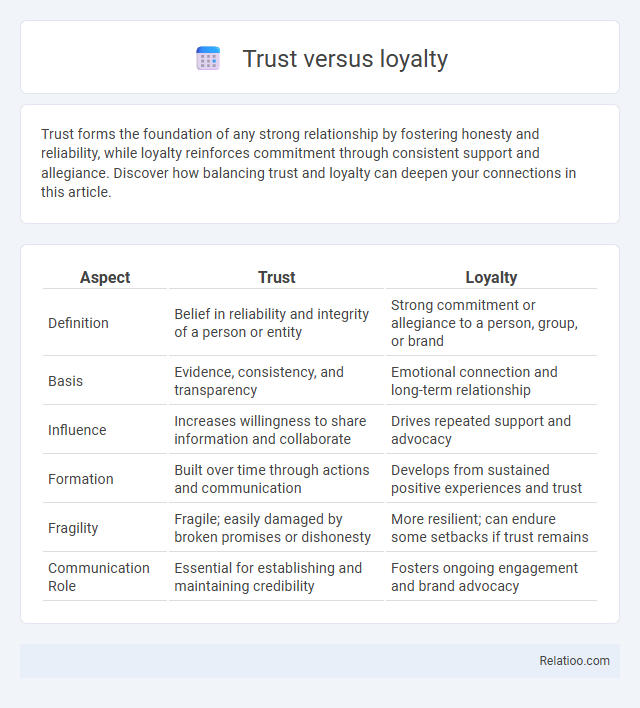Trust forms the foundation of any strong relationship by fostering honesty and reliability, while loyalty reinforces commitment through consistent support and allegiance. Discover how balancing trust and loyalty can deepen your connections in this article.
Table of Comparison
| Aspect | Trust | Loyalty |
|---|---|---|
| Definition | Belief in reliability and integrity of a person or entity | Strong commitment or allegiance to a person, group, or brand |
| Basis | Evidence, consistency, and transparency | Emotional connection and long-term relationship |
| Influence | Increases willingness to share information and collaborate | Drives repeated support and advocacy |
| Formation | Built over time through actions and communication | Develops from sustained positive experiences and trust |
| Fragility | Fragile; easily damaged by broken promises or dishonesty | More resilient; can endure some setbacks if trust remains |
| Communication Role | Essential for establishing and maintaining credibility | Fosters ongoing engagement and brand advocacy |
Understanding Trust: Foundations and Significance
Trust forms the foundation of strong relationships by fostering reliability, honesty, and emotional security. Understanding trust involves recognizing its role in creating mutual respect and enabling effective communication between individuals or organizations. Your ability to build and maintain trust directly impacts the depth of loyalty and commitment in any interaction.
Defining Loyalty: Nature and Characteristics
Loyalty is a steadfast commitment to a person, group, or cause, characterized by consistent support and allegiance even in challenging circumstances. Unlike trust, which relies on confidence in reliability and integrity, loyalty emphasizes emotional attachment and a long-term devotion that often persists despite setbacks. Its nature includes unwavering dedication, prioritizing the relationship's continuity over immediate benefits or changes in conditions.
Key Differences Between Trust and Loyalty
Trust refers to the confidence you place in someone's reliability and integrity, while loyalty emphasizes a consistent allegiance or commitment to a person, group, or cause. Trust is often established through demonstrated honesty and competence, whereas loyalty may persist even in the absence of perfect trust due to emotional bonds or shared values. Understanding these key differences allows your relationships to balance expectation with dedication for stronger connections.
The Psychological Roots of Trust
Trust arises from the brain's release of oxytocin, fostering feelings of safety and attachment crucial for forming bonds. Loyalty often stems from repeated positive experiences and emotional investment, reinforcing commitment over time. Understanding the psychological roots of trust helps you build stronger, more authentic relationships by recognizing its foundational role in human connection.
What Drives Loyalty in Relationships and Organizations
Loyalty in relationships and organizations is driven by consistent trustworthiness, emotional connection, and shared values that align with your personal or collective goals. Trust establishes a reliable foundation where actions match words, fostering confidence and long-term commitment. Understanding how trust fuels loyalty helps strengthen bonds and boost organizational success through mutual respect and meaningful engagement.
How Trust and Loyalty Interact and Influence Each Other
Trust forms the foundation of loyalty by creating a reliable and consistent experience that reassures Your confidence in a person or brand. Loyalty strengthens trust through repeated positive interactions that reinforce commitment and emotional connection. The dynamic interplay between trust and loyalty results in sustained relationships where trust fuels loyalty, and loyalty deepens trust over time.
Building Trust: Strategies and Challenges
Building trust involves consistent transparency, reliable communication, and delivering on promises to foster genuine connections. Challenges include overcoming past breaches, managing expectations, and addressing skepticism that can erode confidence. Your commitment to authenticity and accountability plays a crucial role in developing and maintaining lasting trust.
Fostering Loyalty: Methods and Pitfalls
Fostering loyalty requires consistent trust-building through transparent communication and delivering on promises, which reinforces your brand's credibility. You must avoid common pitfalls such as overpromising, neglecting customer feedback, and failing to personalize interactions, as these can erode trust and weaken long-term relationships. Effective loyalty strategies leverage data-driven insights to tailor experiences, ensuring sustained engagement and emotional connection.
Trust vs Loyalty: Impacts on Personal and Professional Life
Trust forms the foundation of meaningful relationships by fostering reliability and openness, while loyalty reinforces commitment and support during challenges. In personal life, trust enables vulnerability and emotional connection, whereas loyalty ensures long-term dedication despite conflicts. Professionally, trust accelerates collaboration and innovation, and loyalty enhances team cohesion and retention, making both essential for sustained success.
Choosing Between Trust and Loyalty: Which Matters More?
Choosing between trust and loyalty involves evaluating which value better supports your long-term goals and relationships. Trust, being the foundation of reliability and honesty, ensures that interactions are genuine and dependable, while loyalty emphasizes steadfast commitment often despite challenges. Your decision should focus on which quality aligns more with your priorities: consistent truthfulness or unwavering allegiance.

Infographic: Trust vs Loyalty
 relatioo.com
relatioo.com